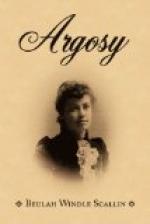“Few hearts have never
loved, but fewer still
Have felt a second passion.
None a third.
The first was living fire;
the next a thrill;
The weary heart can never
more be stirred:
Rely on it the song has left
the bird.”
Very, very true. Her passion for Robert Grame had been as living fire in its wild intensity; it was but the shadow of a thrill that warmed her heart for Philip Hamlyn. Possibly she mistook it in a degree; thought more of it than it was. The feeling of gratification which arises from flattered vanity deceives a woman’s heart sometimes: and Mr. Hamlyn did not conceal his rapturous admiration of her.
She held to her defiant course, and her father held to his. He did not continue to say she should not marry; he had no power for that—and perhaps he did not want her to make a moonlight escapade of it, as Katherine had made. So the preparation for the wedding went on, Eliza herself paying for the rattletraps, as they had been called; Captain Monk avowed that he “washed his hands of it,” and then held his peace.
Whether Mr. Hamlyn and his intended bride considered it best to get the wedding over and done with, lest adverse fate, set afoot by the Captain, should, after all, circumvent them, it is impossible to say, but the day fixed was a speedy one. And if Captain Monk had deemed it “not decent” in Mr. Hamlyn to propose for a young lady after only a month’s knowledge, what did he think of this? They were to be married on the last day of the year.
Was it fixed upon in defiant mockery?—for, as the reader knows, it had proved an ominous day more than once in the Monk family. But no, defiance had no hand in that, simply adverse fate. The day originally fixed by the happy couple was Christmas Eve: but Mr. Hamlyn, who had to go to London about that time on business connected with his property, found it impossible to get back for the day, or for some days after it. He wrote to Eliza, asking that the day should be put off for a week, if it made no essential difference, and fixed the last day in the year. Eliza wrote word back that she would prefer that day; it gave more time for preparation.
They were to be married in her own church, and by its Vicar. Great marvel existed at the Captain’s permitting this, but he said nothing. Having washed his hands of the affair, he washed them for good: had the bride been one of the laundry-maids in his household he could not have taken less notice. A Miss Wilson was coming from a little distance to be bridesmaid; and the bride and bridegroom would go off from the church door. The question of a breakfast was never mooted: Captain Monk’s equable indifference might not have stood that.
“I shall wish them good-luck with all my heart—but I don’t feel altogether sure they’ll have it!” bewailed poor Mrs. Carradyne in private. “Eliza should have agreed to the delay proposed by her father.”




